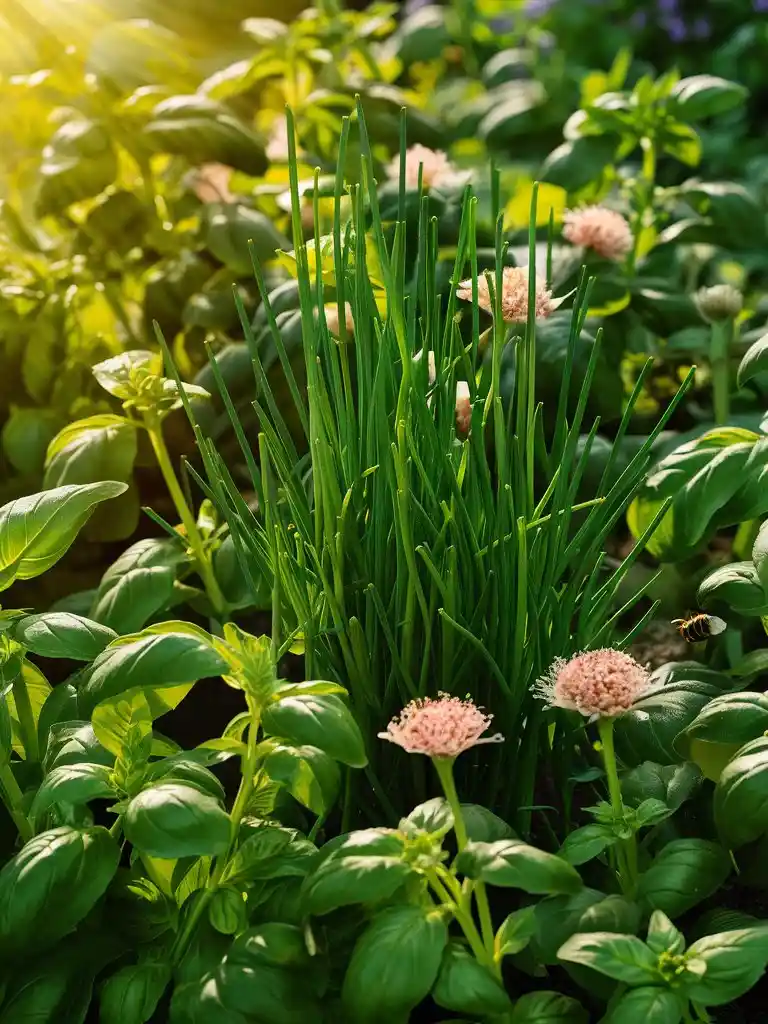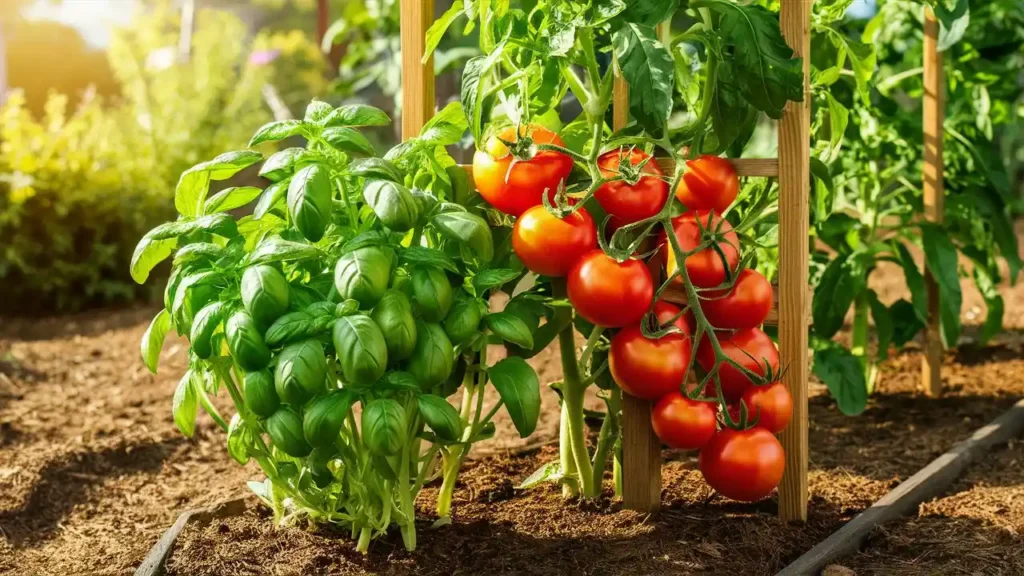Companion Plants for Basil
Basil is a popular herb that can be grown in many different climates. It is a member of the mint family and has a strong, aromatic flavor. Basil is often used in Italian cooking, but it can also be used in other cuisines. Many different companion plants can be grown with basil to improve its growth and flavor. Some of the best companion plants for basil include:
- Tomatoes: Tomatoes are a good companion plant for basil because they help to repel insects. Basil also helps to improve the flavor of tomatoes.
- Peppers: Peppers are another good companion plant for basil. They help to repel insects and also improve the flavor of basil.
- Marigolds: Marigolds are a good companion plant for basil because they help to repel nematodes. Nematodes are tiny worms that can damage basil roots.
- Carrots: Carrots are a good companion plant for basil because they help to improve the flavor of basil. Basil also helps to repel carrot flies.

Basil Companion Plants: Enhancing Growth and Flavor
Basil is a beloved herb that adds a burst of flavor to many dishes. I have found that growing companion plants alongside basil can significantly enhance its growth, health, and flavor. By carefully selecting companion plants that complement basil’s needs, I have been able to create a thriving herb garden that provides me with an abundance of fresh, flavorful basil all season long.
In this article, I will share my insights on the best companion plants for basil. I will discuss how each companion plant benefits basil, whether it helps repel pests, attracts beneficial insects, improves soil health, or enhances flavor. By understanding the unique contributions of each companion plant, you can create a thriving basil garden that meets your specific needs and preferences.
So, let’s dive into the world of basil companion planting and discover how you can elevate your basil’s growth and flavor to new heights!

Tomatoes: A Classic Pairing for Enhanced Growth
Tomatoes and basil are a classic companion planting combination for several reasons. Firstly, tomatoes release a chemical that helps to repel insects, creating a protective environment for basil. In return, basil helps to improve the flavor and yield of tomatoes. This mutually beneficial relationship makes them ideal companions in the garden.
When planting tomatoes and basil together, it is important to space them appropriately. Tomatoes should be planted about 2-3 feet apart, while basil can be planted closer together, about 1-2 feet apart. This allows both plants to receive adequate sunlight and nutrients without overcrowding each other.
To further enhance the benefits of companion planting tomatoes and basil, consider planting marigolds nearby. Marigolds are known for their pest-repellent properties, and their presence can help to protect both tomatoes and basil from common pests such as aphids and whiteflies.
Marigolds: Natural Pest Deterrents for Basil
Marigolds are a vibrant and effective companion plant for basil. Their bright blooms not only add a touch of color to the garden but also serve as a natural pest deterrent. Marigolds release a strong scent that repels insects, including aphids, thrips, and whiteflies, which are common pests of basil. By planting marigolds nearby, you can create a protective barrier around your basil plants, reducing the risk of infestations and damage.
In addition to their pest-repelling properties, marigolds also help improve soil health. They are known to release compounds that suppress nematodes, microscopic worms that can damage basil roots. By planting marigolds as companion plants, you can promote a healthier soil environment for your basil, leading to stronger growth and increased yields.
When planting marigolds with basil, it is recommended to space them about 12-18 inches apart. This will allow both plants to receive adequate sunlight and nutrients while maximizing the pest-repelling benefits of the marigolds. Regular watering and occasional fertilization will help keep both plants thriving and productive throughout the growing season.
Carrots: Improved Soil Health and Nutrient Absorption
Carrots are an excellent companion plant for basil, offering several benefits to its growth and health. Firstly, carrots help improve soil structure by breaking up compacted soil and promoting aeration. This improved soil environment allows for better root development and nutrient absorption by the basil plants.
Moreover, carrots act as a natural pest repellent, particularly against carrot flies. These pests can cause significant damage to basil roots, but the presence of carrots helps deter their presence. The strong scent of carrots repels carrot flies, protecting the basil plants from their harmful effects.
Additionally, carrots are known to enhance the flavor of basil. The sweet taste of carrots complements the aromatic flavor of basil, resulting in a more complex and flavorful herb. By planting carrots alongside basil, you can enjoy a delicious and healthy harvest of both vegetables.
Parsley: Repels Aphids and Attracts Beneficial Insects
Parsley is an excellent companion plant for basil due to its ability to repel aphids, a common pest that can damage basil leaves. Aphids feed on plant sap, causing leaves to curl and turn yellow. Parsley’s strong scent acts as a natural deterrent to these pests, keeping them away from basil plants.
In addition to repelling aphids, parsley also attracts beneficial insects to the garden. These insects, such as ladybugs and lacewings, feed on aphids and other pests, providing natural pest control for basil plants. By planting parsley alongside basil, you can create a mutually beneficial relationship that enhances the health and productivity of both plants.
Chives: Companion Plant for Pest Control and Flavor Enhancement
Chives are an excellent companion plant for basil due to their pest-repelling properties and flavor-enhancing qualities. Their pungent aroma effectively deters common pests such as aphids, thrips, and spider mites, providing natural protection for your basil plants. Additionally, chives contribute to the overall flavor profile of basil, adding a subtle oniony note that complements its aromatic profile. Interplanting chives among basil plants creates a mutually beneficial relationship, promoting healthy growth and enhancing the culinary value of both herbs.
Garlic: Natural Fungicide and Insect Repellent
Garlic is an excellent companion plant for basil due to its natural antifungal and insecticidal properties. The pungent odor of garlic helps deter pests such as aphids, spider mites, and whiteflies. Additionally, garlic releases compounds into the soil that can suppress fungal diseases, such as powdery mildew and damping-off. By planting garlic near your basil, you can create a protective barrier that helps keep your basil healthy and thriving.
When planting garlic as a companion plant for basil, it is best to space the plants about 6-8 inches apart. This allows for adequate air circulation and prevents overcrowding. Garlic can be planted in the spring or fall, and it typically takes about 90-120 days to mature. Once mature, garlic can be harvested and used fresh or dried for later use.
In addition to its pest and disease-repelling properties, garlic can also enhance the flavor of basil. The pungent flavor of garlic complements the aromatic notes of basil, creating a harmonious blend that is perfect for culinary use. Whether you are using basil in salads, sauces, or marinades, adding a touch of garlic can elevate the flavor and create a truly delectable experience.
Onions: Pest Deterrents and Improved Flavor
Onions are another excellent companion plant for basil. They possess natural pest-repellent properties that help deter insects and other pests from attacking basil plants. The pungent odor of onions creates an unfavorable environment for these pests, making it less likely for them to infest the basil. Additionally, onions have been found to improve the flavor of basil, resulting in more aromatic and flavorful leaves.
When planting onions as companion plants for basil, it is recommended to space them approximately 6-8 inches apart. This spacing allows for proper air circulation and prevents overcrowding, which can lead to disease and pest problems. Regular watering and fertilization are essential for maintaining the health and vigor of both basil and onion plants.
By incorporating onions into your basil planting, you can effectively deter pests, enhance the flavor of your basil, and promote overall plant health. This companion planting strategy is a natural and effective way to improve the productivity and quality of your basil harvest.
Lettuce: Companion Planting for Shade and Moisture Retention
Lettuce is an excellent companion plant for basil, particularly in hot and dry climates. Its broad leaves provide shade for the basil, protecting it from the scorching sun and reducing water evaporation from the soil. This creates a more favorable microclimate for basil, promoting healthy growth and preventing wilting. Additionally, lettuce helps retain moisture in the soil, further benefiting basil’s water requirements.
The combination of shade and moisture provided by lettuce creates an environment that discourages pests and diseases. Aphids, a common pest of basil, are less likely to infest plants that are shaded and have access to ample moisture. Similarly, fungal diseases that thrive in warm, humid conditions are less likely to develop in the presence of lettuce.
In addition to its benefits for basil, lettuce also serves as a companion plant for other vegetables in the garden. Its shallow roots make it a suitable companion for deep-rooted plants like tomatoes and peppers. Lettuce also attracts beneficial insects, such as ladybugs and lacewings, which help control pests in the garden.
Peppers: Enhanced Growth and Protection from Pests
Peppers are an excellent companion plant for basil, offering a range of benefits. They help promote basil’s growth and vigor, contributing to larger, more productive plants. Additionally, peppers act as natural pest deterrents, repelling insects that can harm basil, such as aphids and whiteflies. This protective effect helps keep basil plants healthy and thriving, allowing them to reach their full potential.
The combination of enhanced growth and pest protection makes peppers an ideal companion plant for basil. By planting these two species together, gardeners can create a mutually beneficial relationship that results in a bountiful harvest of flavorful basil.
Frequently Asked Questions
What are the best companion plants for basil?
Some of the best companion plants for basil include tomatoes, peppers, marigolds, carrots, parsley, chives, garlic, onions, lettuce, and peppers.
How do companion plants benefit basil?
Companion plants can benefit basil in a variety of ways, including:
- Repelling pests
- Attracting beneficial insects
- Improving soil health
- Enhancing flavor
What are some specific examples of how companion plants can benefit basil?
Here are some specific examples of how companion plants can benefit basil:
- Tomatoes help to repel insects that can damage basil.
- Marigolds help to improve the soil health and repel nematodes.
- Carrots help to improve the flavor of basil and repel carrot flies.
- Parsley helps to repel aphids and attract beneficial insects.
- Chives help to repel pests and enhance the flavor of basil.
- Garlic helps to repel pests and suppress fungal diseases.
- Onions help to deter pests and improve the flavor of basil.
- Lettuce provides shade and moisture retention for basil.
- Peppers help to promote basil’s growth and protect it from pests.